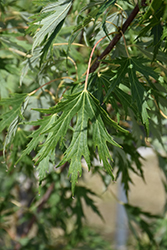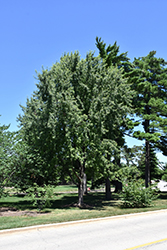Skinner's Cutleaf Silver Maple
Acer saccharinum 'Skinneri'
Height: 40 feet
Spread: 30 feet
Sunlight:
![]()
Hardiness Zone: 3
Other Names: Soft Maple, White Maple
Description:
Finely cut leaves give this specimen tree a delicate and open appearance, certainly much lacier than the species, also more compact and smaller-growing than the species; a good accent plant for summer interest
Ornamental Features
Skinner's Cutleaf Silver Maple has attractive green foliage with silver undersides on a tree with an oval habit of growth. The deeply cut ferny leaves are highly ornamental and turn buttery yellow in fall. It features showy clusters of red flowers along the branches in early spring before the leaves. The furrowed silver bark and brick red branches add an interesting dimension to the landscape.
Landscape Attributes
Skinner's Cutleaf Silver Maple is an open deciduous tree with a shapely oval form. It lends an extremely fine and delicate texture to the landscape composition which can make it a great accent feature on this basis alone.
This tree will require occasional maintenance and upkeep, and should only be pruned in summer after the leaves have fully developed, as it may 'bleed' sap if pruned in late winter or early spring. It has no significant negative characteristics.
Skinner's Cutleaf Silver Maple is recommended for the following landscape applications;
- Accent
- Shade
Planting & Growing
Skinner's Cutleaf Silver Maple will grow to be about 40 feet tall at maturity, with a spread of 30 feet. It has a high canopy of foliage that sits well above the ground, and should not be planted underneath power lines. As it matures, the lower branches of this tree can be strategically removed to create a high enough canopy to support unobstructed human traffic underneath. It grows at a fast rate, and under ideal conditions can be expected to live for 80 years or more.
This tree should only be grown in full sunlight. It is quite adaptable, prefering to grow in average to wet conditions, and will even tolerate some standing water. It is not particular as to soil type or pH. It is highly tolerant of urban pollution and will even thrive in inner city environments. This is a selection of a native North American species.

